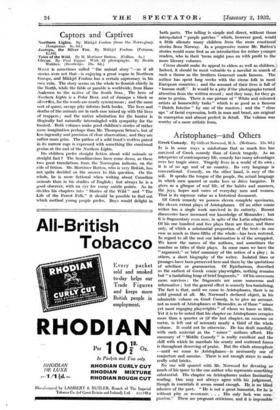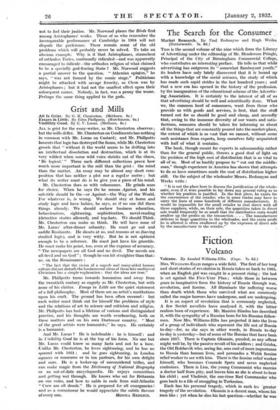Aristophanes—and Others
Greek Comedy. By Gilbert Norwood, M.A. (Methuen. 12s. ed.) kr is in some ways a misfortune that so much less has survived of Greek comedy than of Greek tragedy. As an interpreter of contemporary life, comedy has many advantages over her tragic sister. Tragedy lives in a world of its own ; it is of no age and of no country. Its very language is conventional. Comedy, on the other hand, is racy of the soil. It speaks the tongue of the people, the actual language in which men quarrel or make love or drive bargains. It gives us a glimpse of real life, of the habits and manners, the joys, hopes and cares of everyday men and women. That is its supreme value as a historical document.
Of Greek comedy we possess eleven complete specimens, the eleven extant plays of Aristophanes. Of no other comic writer has a single work survived in its entirety. Recent discoveries have increased our knowledge of Menander ; but it is fragmentary even now, in spite of the Latin adaptations. Of his one hundred and five plays there are three, and three only, of which a substantial proportion of the text—in one ease as much as three-fifths of the whole—has been restored. In regard to all the rest our information is of the scrappiest: We know the names of the authors, and sometimes the number or titles of their plays. In some cases we have the " argument," or brief summary of the action of a play ; in others, a short biography of the writer. Isolated lines or passages have been preserved here and there by the quotations of scholiast or grammarian. Of Epieharmus, described as the earliest of Greek comic playwrights, nothing remains but " a tantalising heap of brief fragments." Of his successors more survives ; the fragments are more numerous and informative ; but the general effect is scarcely less tantalising. The fact is that, until we come to Aristophanes, there is no solid ground at all. Mr. Norwood's declared object, in his admirable volume on Greek Comedy, is to give an account. not so much of Aristophanes or Menander, as of those " minor yet most engaging playwrights" of whom we know so little. Yet it is to be noted that his chapter on Aristophanes occupies more than a quarter or (if the last chapter, an excursus on metre, is left out of account) nearly a third of the whole volume. It could not be otherwise. He has dealt' manfully • with such material as the " minor " authors afford. HIS summary of " Middle Comedy " is really excellent and the skill with which he marshals his scanty and scattered forces is throughout deserving of praise. But the whole atmosphere —until we come to Aristophancs—is necessarily one of conjecture and surmise. There is not enough straw to make really solid bricks.
No one will quarrel with Mr. Norwood for devoting so much of his space to the one author who represents something substantial. His chapter on Aristophanes makes fascinating reading. One may not always agree with his judgement, • though in essentials it seems sound enough. He is no blind admirer of the poet. " He is not a great humorist, for he is without pity or reverence. . . . His only lack was corn.. passion." These arc pregnant criticisms, and it is impossible not to feel their justice. Mr. Norwood places the Birds first among Aristophanes' works. Those of us who remember the incomparable performance at Cambridge in 1904 will not dispute the preference. There remain some of the old problems which will probably never be solved. To take an obvious example. Why is it that Aristophimes, staunchest of orthodox Tories, continually ridiculed—and was apparently encouraged to ridicule—the orthodox religion of what claimed to be a specially god-fearing State ? Mr. Norwood suggests a partial answer to the question. " Athenian opinion," he says, was not formed by the comic stage." Politicians might be attacked with savage ferocity, as Cleon was by Aristophanes ; but it had not the smallest effect upon their subsequent career. Nobody, in fact, was a penny the worse. Perhaps the same thing applied to the gods.







































 Previous page
Previous page